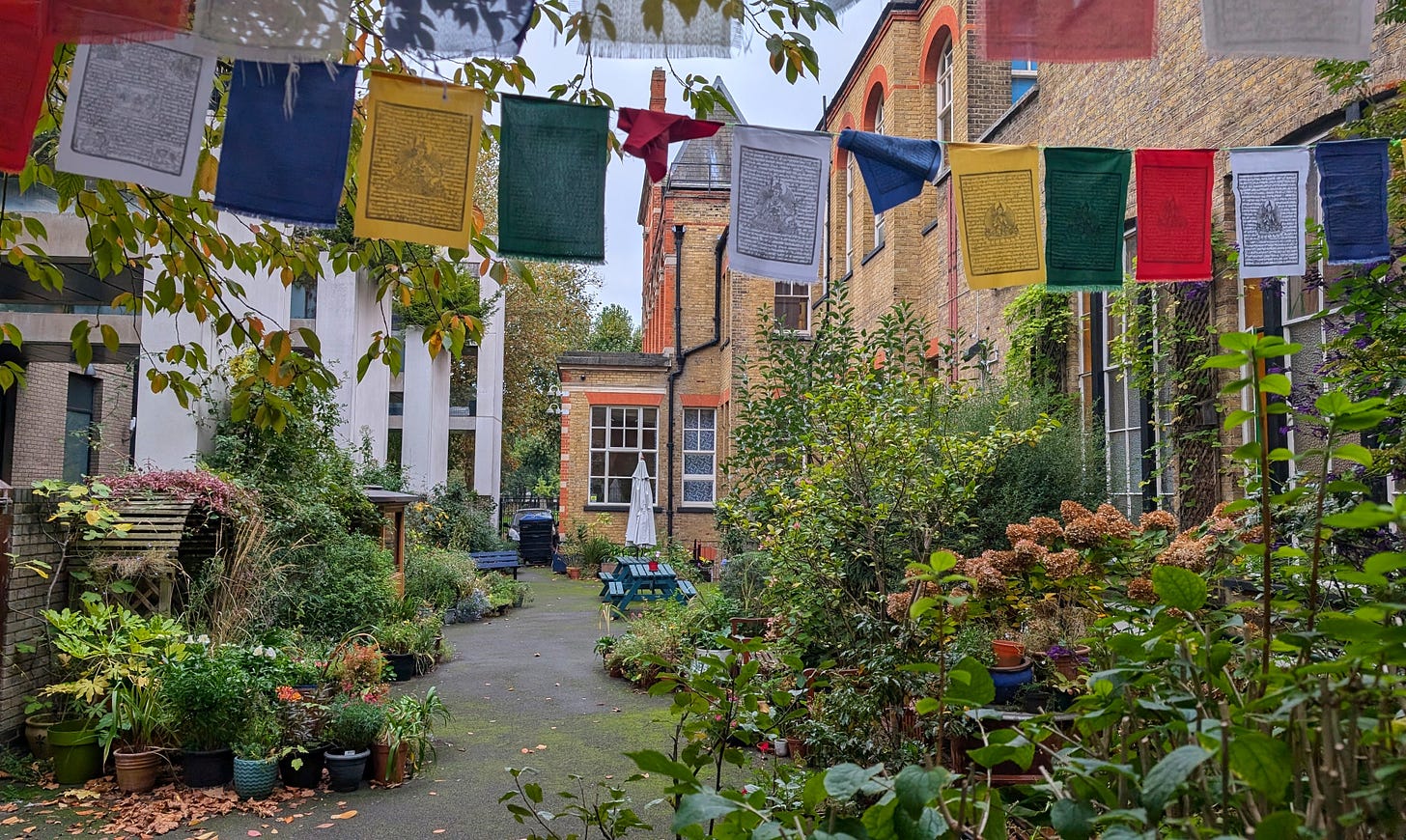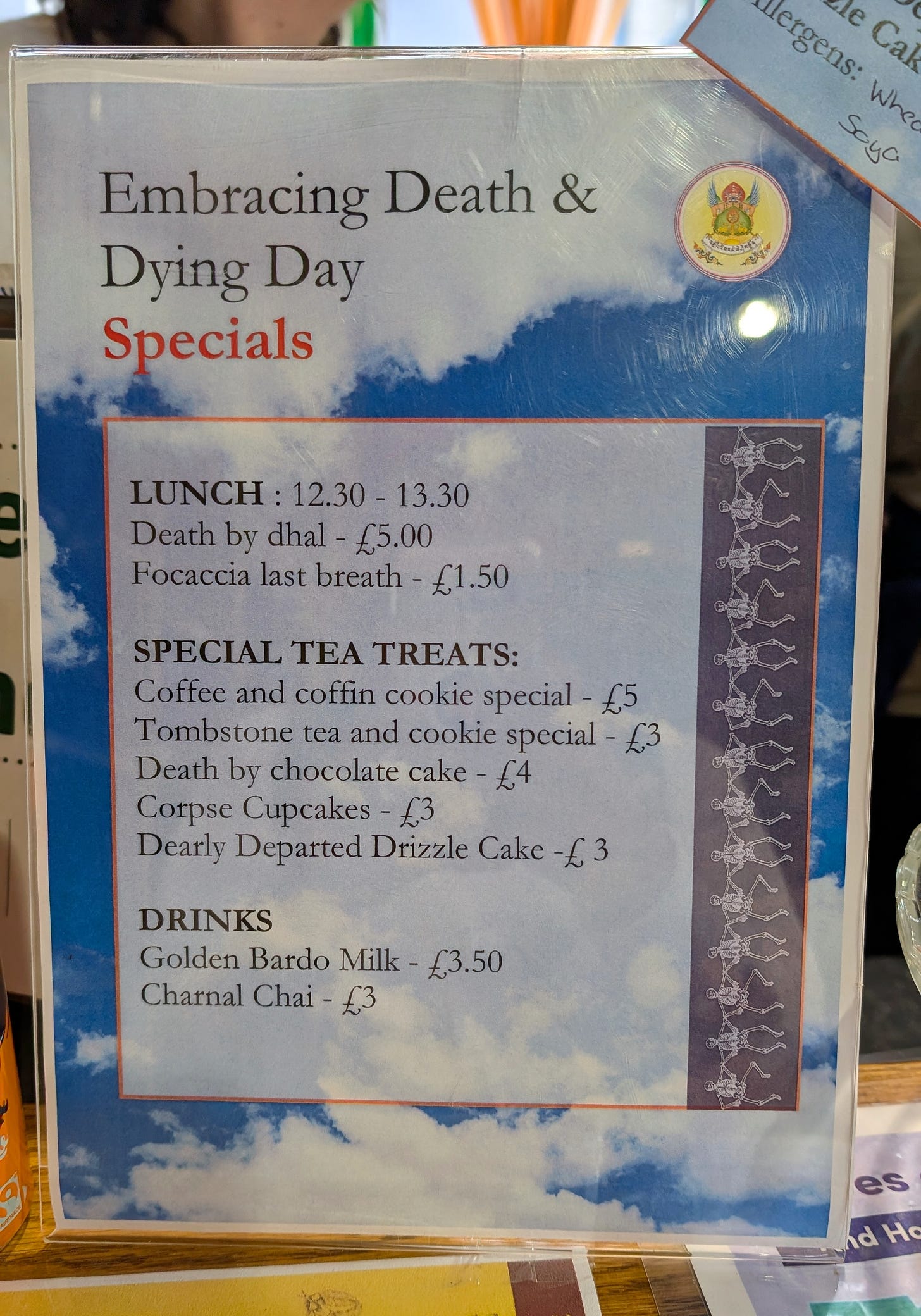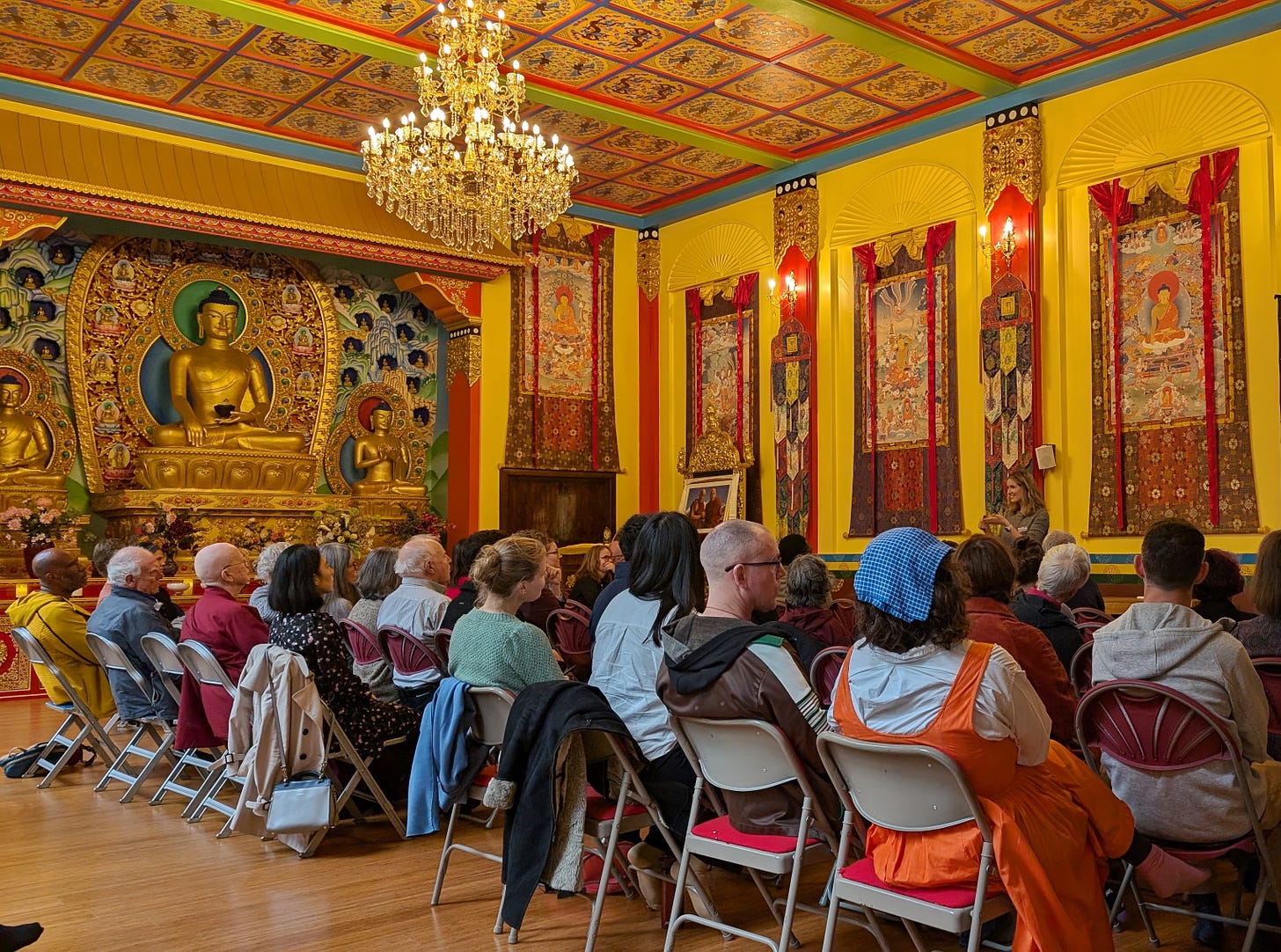We all know how this ends
I attended an empowering day of talks about death, this is what I learnt
Hi! This is Leyla from A Day Well Spent, a newsletter seeking pathways to more purposeful living.
What subscribers received recently:
'The privilege of a lifetime is being who you are' — an interview
Dislike gyms? Me too. What I use to strength train at home
The world according to your Mum doing the washing by Joshua Idehen
You can subscribe with your email to ensure you never miss my posts:
If you appreciate this piece please let me know by tapping the ❤️ at the top or bottom or by forwarding it on — thank you!
Memento mori, memento vivere
Remember that you must die, remember that you must live
On Saturday my brother and I hung out for the full day, an occurrence that doesn’t happen often enough. We had a really great time. But we didn’t go for brunch, visit an exhibition or play a sport together.
How we chose to spend the day was by attending a series of talks from various professionals, from morning until early evening, about their experience around death and dying. It had been in the calendar for months.
‘Yeah, starting your weekend with an 8 hour lecture about death is an interesting way to spend your time,’ his paediatrics junior doctor friend had messaged him, whose profession exposes her to more than her fair share of death.
It was a fair comment.
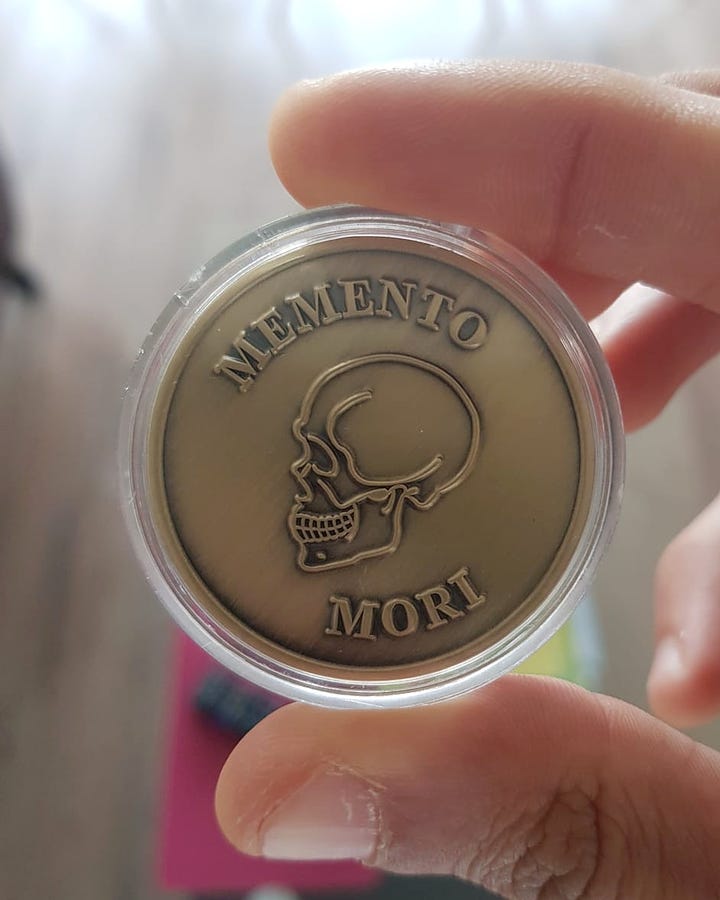
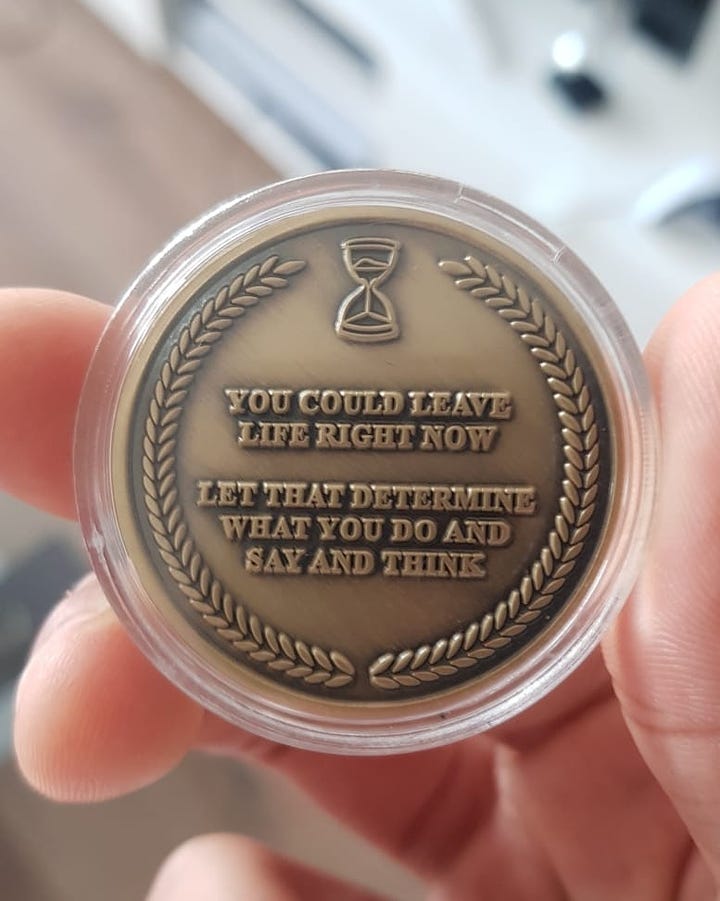
The day is called Embracing Death & Dying: A Celebration of Life Through Reflection on Death and it’s billed as ‘a place to share ideas and practical advice on death and dying’.
It's an annual event free to attend that takes place at Kagyu Samye Dzong London (KSDL) Tibetan Buddhist Centre in Bermondsey, south east London, organised by The Bardo Group.
I only knew this day was even a thing thanks to lucid dreaming teacher, Buddhist and bestselling author, Charlie Morley, who I interviewed for my Substack last year (it really is a great interview, do have a listen).
Charlie is part of the community at the centre and happened to live around the corner from it at the time. On the day I interviewed him, the death and dying day had just passed and he had been one of the speakers.
His mother had passed away just a few months before.
‘A day all about death and dying? Sounds delightful…’ I grimaced
‘It’s more of a we’re all going to die so let’s live our lives vibe, rather than oh no we’re all going to die sad face vibe. It’s a really uplifting and empowering day. You should come along next year.’
Charlie was fizzing with enthusiasm about acknowledging and respecting death in this way. His reaction and recent bereavement alone made me curious as to his relationship with our ultimate fate and the relationship Buddhists have with death in general.
He spoke of the day so highly, he sold it so well. Plus, it’s not a topic I consider much – or perhaps more accurately, consciously try to bury out of sight and mind – despite it being a fact of life.
I’m not a Buddhist and the event is open to anyone and everyone. So at the end of our interview recording, I vowed to myself that I would go to the death and dying day in 2024. I knew my brother would be interested and open to it too. And so that’s how our past Saturday came to be.
The day was uplifting, empowering, informative, poignant, thought-provoking, generous, comforting and enlightening. It truly felt like a day well spent. And I would highly recommend anyone to attend next year.
The menu descriptions in the tea room are worth it alone.
Wisdoms from a hospice chaplain
Hospice chaplain and author Steve Nolan, who on a daily basis supports people who are dying and their families, spoke of the spiritual care at the end of life, which is much broader than religious care.
He told us that even though we all know death is going to happen, so few of us pay any attention to it. We fail to prepare for the inevitable.
One of the questions he gets asked the most is, ‘What do I say to a dying person?’
His wisdom was that the challenge is not what to say, but being able to be there, to be present and to listen. He quoted the phrase hearing to speech, coined by late feminist theologian Nelle Morton, which is the ability to enable a person to express thoughts and feelings they weren’t even aware were in them.
Dying isn’t a problem to solve, he said. It’s a life experience to go through and to assimilate. To allow people to vent, express themselves, get out whatever they need to get out.
It's a shared human experience. Death and dying is humanity's common thread.
A different way of doing funerals
Clare Montagu, the funeral director of B-Corp certified Poppy’s in Tooting in southwest London (which operates across the country), told us everything we need to know about funerals. And some things we probably had no idea about.
Their approach to funerals is a modern and fresh one where instead of following rigid traditions (staff don’t wear black and their branding is bright orange), they actually listen to what people want and need.
They also don’t hide anything behind closed doors. Amazingly (I thought), their mortuary – a light filled space in a converted chapel – is open to the public. They actively welcome people to visit.
As Clare mentioned, people tend to organise only one or two funerals in their lifetime and most don’t think about them prior to the point they are actually needed. Which means folk tend to settle on a rushed decision with the local funeral directors on the high street.
But the funeral industry is not regulated in the UK (!!) and so the level of care for both the living and dead varies hugely. This was a revelation to me.
I also learnt that other than having to register a death within five days, there are actually no other laws around death and funerals (in England). A bit like a wedding, a funeral can look like anything you want, truly expressing the personality of the deceased. You don’t need a hearse and for a burial, you don’t even need a coffin — you could just use a shroud.
Who knew!
In England if you own the land, you can be buried on it – it just has to be added to the deeds. And if you keep the house cool, the dead can remain at home for a number of days before being collected by the funeral directors, there is no rush to do anything.
Who knew!
There was a coffin display too, including a gorgeous willow one hand-weaved, basket style. They do coffins made of bamboo, banana leaf, wool. And even robust cardboard coffins – very affordable but beautiful in their simplicity – which are often painted or decorated by loved ones.
Claire covered so many things most people don’t know about; everything she said was a revelation to me.
‘You learn more about life when you work with the dead,’ she said.
Death, from a medical perspective
Dr Liam Gabb, who is doing a PhD at King’s College London, looking at priorities towards the end of life for people with dementia, gave a talk about what happens when we die, from a medical perspective.
He spoke about what the body goes through in the last months, weeks, days and hours and explained the different processes.
For example, reflexes will slow right down, including the reflex to swallow or cough when saliva builds at the back of the throat. This leads to a crackling or wet sound as the person breathes, colloquially known as ‘the death rattle’. This can be distressing for loved ones to hear but it is in fact a normal part of the dying process and the person in question feels no discomfort.
This insight might sound morbid to some, but half the challenge when dealing with death is not knowing about these sorts of things in advance.
Charlie Morley (the lucid dreaming teacher I interviewed) was on the panel discussion, the last talk of the day. He spoke passionately about the immense privilege he has had acting as a death doula for Buddhists who are passing, performing the rituals and prayers that need to be done before, during and after death.
He said that the greatest gift you can give to someone dying and their loved ones is not fearlessness, but familiarity. Being familiar with the situation. Even knowing what a dead person looks like, as the level of shock for the first time can limit what we can offer.
I am seriously considering visiting the Poppy’s mortuary. It’s also happens to be just down the road from me.
Death Café
The Death Café is a global movement which started in the UK in 2011. The idea of the founder, Jon Underwood, was that the only way to get British people to talk about death was to give them tea and cake.
He was onto something and so the movement was born.
It’s a space where people – often strangers – gather to eat cake, drink tea and discuss death for approximately one hour. Sessions happen all over the world and they are run on a monthly basis at the Buddhist centre in Bermondsey, either online or in person for £5 entry (the tea and cake is free!).
The objective of Death Café is 'to increase awareness of death with a view to helping people make the most of their (finite) lives'. It’s not grief support or a counselling session. It’s a group directed discussion of death with no agenda, objectives or themes.
Charlie Morley is hosting the next one at the Buddhist centre on 23rd November, if anyone is local and free (I can’t make it).
Some of the prompts discussed at the cafés are:
What was your first experience of death?
What is your definition of ‘a good death’?
What happens just after death?
Are you ready?
That last one got me.
Dying is natural and normal
It also has a 100% success rate, eventually; no one has escaped it yet. Yet we rarely acknowledge it or talk about it, until the moment we are forced to.
So much of the dying process remains unknown to so many of us because most of our dying in the western world today happens behind the closed doors of hospitals. It used to be commonplace for dying to happen in the familiarity and comfort of a home, with loved ones present.
It is partly within this unknown that the fear of death lies.
Shining a light onto it – simply by having these conversations and reflecting on it – can do wonders in diminishing that fear. Doing so doesn’t ‘jinx’ things or invite the grim reaper to come knocking early. It is simply giving space to a key part of life.
We’re all going to encounter death and have to deal with it at some point, if we haven’t already. It seems to me that someone dying is a bit like someone being born, in that you can never fully prepare for it. You can’t ever really know what it will be like until it actually happens.
Having said that, I’ll end with something Peter Kwong from KSDL Bardo Group said in his talk on the importance of reflecting on death, which I found comforting and uplifting:
‘The best way to prepare for death is to live well. Be mindful, be kind, reflect on these things. And in that way, you will be prepared.’
Memento mori, memento vivere
Whilst considering the brevity of life, we also need to hold that knowledge in tension with how incredible life can be, when we remember to live it well.
Useful links
Here are some useful resources that were shared during the day’s talks.
GriefCast – a podcast that examines the human experience of grief and death but with comedians, so it’s cheerier than it sounds.
compassionindying.org.uk - for planning and recording your wishes in a living will (advance statement) and legally binding Advance Decision to Refuse Treatment (ADRT).
digitallegacyassociation.org – raising awareness and improving areas relating to digital assets planning and digital legacy safeguarding.
Lasting Power of Attorney (LPA) – a legal document that lets you appoint a person to help you make decisions or make decisions on your behalf, if you cannot make your own.
London Universal Urgent Care Plan – an NHS service that enables every Londoner to have their care and support wishes digitally shared with healthcare professionals across the capital.
Books
Listen – how to find the words for tender conversation by Kathryn Mannix
We All Know How This Ends – lessons about life and living from working with death and dying by Anna Lyons and Louise Winter (the title of which I borrowed for this column)
Dear Life – a doctor’s story of love and loss by Rachel Clarke
When Breath Becomes Air – the ultimate moving life-and-death story by Paul Kalanithi
Being Mortal – medicine and what matters in the end by Atul Gawande
If you appreciate this piece please let me know by tapping the ❤️ at the top or bottom or by forwarding it on — thank you.
As always, I’d love to hear your thoughts! Is death a topic you reflect on much?
And for those who feel up for it, I thought we could perhaps have our own little Death Café in the comments:
What was your first experience of death?
What is your definition of ‘a good death’?
What happens just after death?
Are you ready?
Who’s bringing the cake and tea? See you down in the comments.





